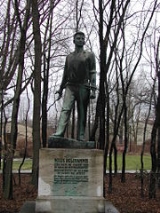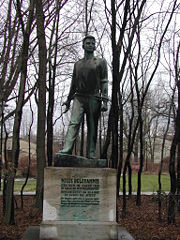
Nikos Beloyannis
Encyclopedia

Peloponnese
The Peloponnese, Peloponnesos or Peloponnesus , is a large peninsula , located in a region of southern Greece, forming the part of the country south of the Gulf of Corinth...
, Greece
Greece
Greece , officially the Hellenic Republic , and historically Hellas or the Republic of Greece in English, is a country in southeastern Europe....
) in 1915. He came from a relatively prosperous family and went on to study Law
Law
Law is a system of rules and guidelines which are enforced through social institutions to govern behavior, wherever possible. It shapes politics, economics and society in numerous ways and serves as a social mediator of relations between people. Contract law regulates everything from buying a bus...
in Athens
Athens
Athens , is the capital and largest city of Greece. Athens dominates the Attica region and is one of the world's oldest cities, as its recorded history spans around 3,400 years. Classical Athens was a powerful city-state...
, but before being able to graduate he was arrested and jailed in the Akronauplia prison (Nauplion) by the Ioannis Metaxas
Ioannis Metaxas
Ioannis Metaxas was a Greek general, politician, and dictator, serving as Prime Minister of Greece from 1936 until his death in 1941...
quasi-fascist regime in the 1930s and transferred to the Germans after the Nazi
Nazism
Nazism, the common short form name of National Socialism was the ideology and practice of the Nazi Party and of Nazi Germany...
Occupation of the country (1941). He escaped in 1943 and joined the Greek People's Liberation Army (ELAS) in Peloponnese in the side of Aris Velouchiotis
Aris Velouchiotis
Aris Velouchiotis , the nom de guerre of Athanasios Klaras , was the most prominent leader and chief instigator of the Greek People's Liberation Army , the military branch of the National Liberation Front , which was the major resistance organization in occupied Greece from 1942 to 1945...
. After becoming Political Commissioner of the Democratic Army of Greece
Democratic Army of Greece
This article is based on a translation of an article from the Greek Wikipedia.The Democratic Army of Greece , often simply abbreviated to its initials DSE , was the army founded by the Communist Party of Greece during the Greek Civil War, 1946–1949...
(DSE) during the Greek Civil War
Greek Civil War
The Greek Civil War was fought from 1946 to 1949 between the Greek governmental army, backed by the United Kingdom and United States, and the Democratic Army of Greece , the military branch of the Greek Communist Party , backed by Bulgaria, Yugoslavia and Albania...
he was one of the last to leave the country (1949) after its defeat.
In June 1950 Beloyannis returned to Greece in order to re-establish the Athens organization of the Communist Party of Greece
Communist Party of Greece
Founded in 1918, the Communist Party of Greece , better known by its acronym, ΚΚΕ , is the oldest party on the Greek political scene.- Foundation :...
(KKE) that had been declared illegal. He was arrested on December 20, 1950 and was taken before a court-martial
Court-martial
A court-martial is a military court. A court-martial is empowered to determine the guilt of members of the armed forces subject to military law, and, if the defendant is found guilty, to decide upon punishment.Most militaries maintain a court-martial system to try cases in which a breach of...
on charges of violating Compulsory Law 509/1947, which criminalized the Communist Party of Greece (KKE). He was also accused of being a traitor, transmitting information to the Soviet Union
Soviet Union
The Soviet Union , officially the Union of Soviet Socialist Republics , was a constitutionally socialist state that existed in Eurasia between 1922 and 1991....
.
The Beloyannis trial started in Athens on October 19, 1951. In total, 94 people were accused. One of the three members of the court-martial was Georgios Papadopoulos who later (1967) became the leader of the military dictatorship of 1967-1974.
Beloyannis denied all accusations and stressed the patriotic nature of his actions during the anti-Nazi resistance (1941—1944), the British
United Kingdom
The United Kingdom of Great Britain and Northern IrelandIn the United Kingdom and Dependencies, other languages have been officially recognised as legitimate autochthonous languages under the European Charter for Regional or Minority Languages...
intervention (1944–1946) and the Greek Civil War
Greek Civil War
The Greek Civil War was fought from 1946 to 1949 between the Greek governmental army, backed by the United Kingdom and United States, and the Democratic Army of Greece , the military branch of the Greek Communist Party , backed by Bulgaria, Yugoslavia and Albania...
(1946–1949). He became globally known as the "Man with the Carnation" and as such he was depicted in a famous Pablo Picasso
Pablo Picasso
Pablo Diego José Francisco de Paula Juan Nepomuceno María de los Remedios Cipriano de la Santísima Trinidad Ruiz y Picasso known as Pablo Ruiz Picasso was a Spanish expatriate painter, sculptor, printmaker, ceramicist, and stage designer, one of the greatest and most influential artists of the...
sketch. Beloyannis made an impassioned defense of the achievements of the resistance and exposed the fact that in the postwar years people who had fought the Nazis were persecuted for their left-wing views, while Nazi collaborators were rewarded with posts in state and government, because of the Cold War atmosphere.
Despite national and international appeals for clemency, in 15-16 of November the court-martial sentenced Beloyannis and eleven of his comrades to death. Four of them were taken from the prison of Kallithea
Kallithea
Kallithea is the 8th largest municipality in Greece and the 4th biggest in the Athens urban area...
early in the morning of Sunday March 30, 1952 and were executed in the Goudi camp. The sentence to the other co-defendants of Belogiannis was commuted to life imprisonment but by the mid-1960s all were released from prison.
Beloyannis became one of the great heroes of the Greek resistance, and a symbolic victim of the authoritarian postwar establishment. His name was given to the village of Beloiannisz
Beloiannisz
Beloiannisz is a village in Fejér county, Hungary. It was founded by Communist Greek refugees who left Greece after the civil war, and was named after Nikos Beloyannis .-Location:...
built in Hungary
Hungary
Hungary , officially the Republic of Hungary , is a landlocked country in Central Europe. It is situated in the Carpathian Basin and is bordered by Slovakia to the north, Ukraine and Romania to the east, Serbia and Croatia to the south, Slovenia to the southwest and Austria to the west. The...
to house the Greek political refugees who lived in exile from the end of the civil war (1949) until the fall of the Papadopoulos junta and the re-establishment of democracy in Greece (1974).
Cultural references
- Pablo Picasso's sketch "Man with the carnation"
- Peter de Francia, "The Execution of Beloyannis", (1953)
- Nikos Tzimas' movie "Anthropos me to garyfallo, O (1980)"

